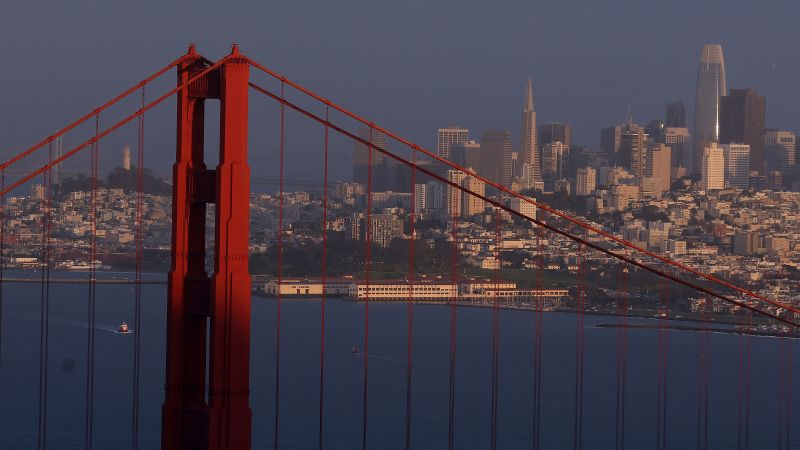When the Supreme Court takes up an important environmental appeal Wednesday from the City of San Francisco, the justices will be asked to settle a dispute that at least some city leaders are desperately hoping to lose.
That’s because the unusual case involving sewage discharges into the Pacific Ocean has put a city known for its uber-liberal politics in league with the oil and gas industries, queuing up a fight that the court’s 6-3 conservative supermajority may use to weaken clean water regulations nationally.
“We’re setting a playbook for a lot of other polluters,” lamented Scott Webb, vice chair of the Sierra Club San Francisco Bay Chapter. “It’s shocking that it’s coming from San Francisco.”
Last week, San Francisco’s board of supervisors voted 8-2 to urge city officials to resolve the suit quickly, warning that a Supreme Court ruling in its favor could “greatly harm water quality nationwide.” That resolution was not binding, however, and the city’s attorney said he has no intention of backing down.
“I’m very nervous about going to the court,” San Francisco Supervisor Myrna Melgar told CNN, stressing that she was not opining on the city’s legal strategy but rather the wisdom of taking an environmental case to the conservative high court. “We run the risk of having it apply to everybody.”
The hesitation reflects the fact that the court’s conservatives have repeatedly ruled against the Environmental Protection Agency in recent years and have also limited the power of federal agencies to act without explicit authority from Congress. Both factors suggest a win for San Francisco.
And that’s exactly what some San Franciscans fear.
Underneath the political brawl is a fight over San Francisco’s sewer system, which – like many cities – is unable to fully treat all of its wastewater after heavy storms. When one of its treatment facilities reaches capacity, the city winds up pumping barely treated sewage into the Pacific Ocean.
For decades, the EPA set limits under the Clean Water Act on how much “effluent” the city could dump into the sea. But in 2019, federal regulators also required the city to meet two generic provisions – including a requirement that any discharges “not cause or contribute to a violation of any applicable water quality standard…for receiving waters.”
City officials say that standard is impossibly fuzzy. City attorney David Chiu said EPA’s requirements make San Francisco liable for enforcement actions without providing specific targets for how much sewage is too much. And that, he said, puts San Francisco on the hook for the overall water quality of the Pacific Ocean.
“It’s an unworkable standard. We’ve been asking for clear guidance and the EPA hasn’t given us specific answers,” Chiu told CNN. “Cities and counties all over the country are joining us to ask for clarity.”
Chiu flatly rejected requests for the city to settle the litigation.
“The answer’s no,” he said, adding that fully addressing the problem of sewer overflows would cost city ratepayers billions of dollars.
Wastewater agencies from across the nation are siding with San Francisco, including those in Boston, New York, Tacoma, Indianapolis and Louisville.
The National Mining Association, the American Petroleum Institute and the American Chemistry Council have also filed briefs backing the city because they fear becoming “legally responsible for the overall quality” of water.
In other words, a win for San Francisco could undermine the EPA’s ability to police a broader swath of polluters. And that has given environmentalists and others following the case pause.
“What’s going on is tactically shortsighted on all sides,” said Dave Owen, a law professor at the University of California San Francisco. “EPA and San Francisco, by litigating this case before the Supreme Court, are putting a piece of state and federal authority at risk.”
The dispute arrives the Supreme Court at a time when the EPA has endured a series of significant blows from the court’s conservative bloc.
In June, a 5-4 majority upended President Joe Biden’s effort to reduce smog and air pollution wafting across state lines in what was known as the “good neighbor” rule. A year earlier, the court reduced the EPA’s ability to regulate wetlands under the Clean Water Act.
In 2022, the court curbed the agency’s ability to broadly regulate carbon emissions from existing power plants.
The court has also steadily undermined the power of federal agencies in recent years in cases that have nothing to do with the environment.
In a major ruling this summer, a 6-3 majority overturned a 1984 precedent that directed courts to defer to federal agencies interpreting vague laws. In siding with the EPA in the San Francisco case last year, the 9th US Circuit Court of Appeals relied in part on that precedent.
The Clean Water Act, enacted in 1972, allows the EPA to set clear discharge limits as well as “any more stringent limitation” the agency views as “necessary to meet water quality standards.”
That sweeping language, the Biden administration argues, “unambiguously establishes” that EPA has the power impose broad requirements on polluters besides specific discharge limits.
Earlier this year, in a case dealing with rioters on January 6, 2021, a 6-3 majority declined to read a “catch all” provision of another law as granting sweeping power to prosecute members of the mob on obstruction charges. That’s because, like the Clean Water Act, the provision at issue in the criminal statute followed more specific language dealing with evidence tampering.
Environmentalists fear a similar reading of the Clean Water Act could have disastrous results.
Webb, the Sierra Club advocate, described the city’s approach as “risky.”
“It’s a pretty crazy game of chicken they’re playing,” he said.
Read the full article here



